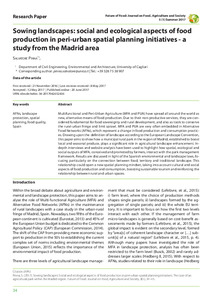| dc.date.accessioned | 2017-06-27T11:28:49Z | |
| dc.date.available | 2017-06-27T11:28:49Z | |
| dc.date.issued | 2017-06-20 | |
| dc.identifier.issn | 2197-411X | |
| dc.identifier.uri | urn:nbn:de:hebis:34-2017042652436 | |
| dc.identifier.uri | http://hdl.handle.net/123456789/2017042652436 | |
| dc.language.iso | eng | |
| dc.publisher | Department of Organic Food Quality and Food Culture at the University of Kassel, Germany and Federation of German Scientists (VDW) | eng |
| dc.rights | Urheberrechtlich geschützt | |
| dc.rights.uri | https://rightsstatements.org/page/InC/1.0/ | |
| dc.subject | AFNs | eng |
| dc.subject | landscape protection | eng |
| dc.subject | spatial planning | eng |
| dc.subject | food quality | eng |
| dc.subject | Spain | eng |
| dc.subject.ddc | 630 | |
| dc.title | Sowing landscapes: social and ecological aspects of food production in peri-urban spatial planning initiatives - a study from the Madrid area | eng |
| dc.type | Aufsatz | |
| dcterms.abstract | Multifunctional and Peri-Urban Agriculture (MFA and PUA) have spread all around the world as new, alternative means of food production. Due to their non-productive services, they are considered fundamental for food sovereignty and rural development, and also as tools to conserve the rural-urban fringe and limit sprawl. MFA and PUA are very often embedded in Alternative Food Networks (AFNs), which represent a change in food production and consumption practices. Drawing upon the definition of landscape according to the European Landscape Convention, this paper aims to show how a municipal rural park in the region of Madrid, established to boost local and seasonal produce, plays a significant role in agricultural landscape enhancement. In-depth interviews and website analysis have been used to highlight how spatial, ecological and social outputs of MFA, conceived and promoted by farmers, interact with the park management framework. Results are discussed in light of the Spanish environmental and landscape laws, focusing particularly on the connection between food, territory and traditional landscape. This relationship could open a new spatial planning mindset, taking into account cultural and social aspects of food production and consumption, boosting sustainable tourism and reinforcing the relationship between rural and urban spaces. | eng |
| dcterms.accessRights | open access | |
| dcterms.bibliographicCitation | In: Future of Food: Journal on Food, Agriculture and Society. Witzenhausen : University of Kassel, Department of Organic Food Quality and Food Culture. - Vol. 5, No. 1 (2017), S. 34-45 | |
| dcterms.creator | Pinna, Salvatore | |

